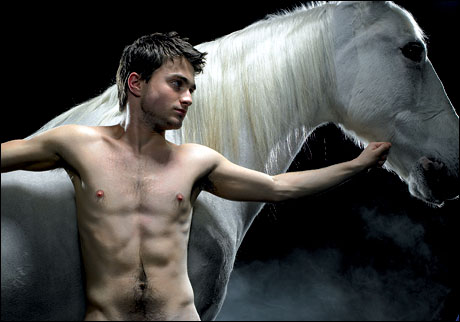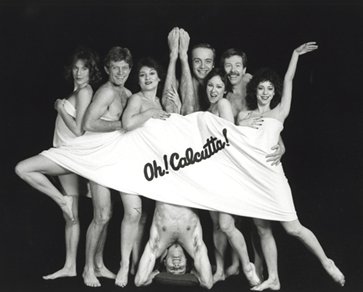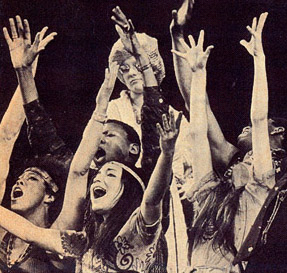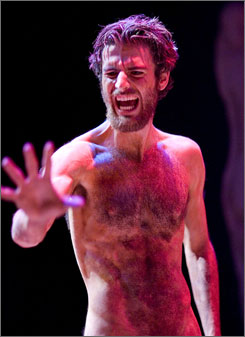 www.socalnaturist.org |

|
The Movie BuffTM:
|

|
Why Does Stage Nudity Still Shock Us? Does stage nudity, even in our enlightened age, still have the power to shock? Judging by the hoo-ha surrounding young Daniel Radcliffe's appearance in the buff in Peter Shaffer's Equus, the answer would seem to be a resounding yes. With Radcliffe posing for peek-a-boo pictures that stop just short of his pubic hair, the press and the publicity machine seem to be engaged in some kind of mad titillatory game. I just hope all this scrutiny of Radcliffe doesn't distract attention from what is meant to be a serious play. What is astonishing, looking back, is how relatively recent stage nudity is. Even 40 years ago, private parts were not meant to be seen in public places, as the critic Nicholas de Jongh makes clear in his book Politics, Prudery and Perversions: The Censoring of the English Stage 1901-1968. Female nudes were tolerated at the Windmill as long as they didn't move. Osborne's 1957 play The Entertainer, which satirised tatty nude revues, featured a bare Britannia and was scrutinised by the Lord Chamberlain "for fear of the sight of a pudendum.” According to De Jongh, the censor forbade in 1967 a naked statue of the president of the United States in Mrs. Wilson's Diary. So much for the special relationship. Everything radically changed in 1968, the "year of revolutions" that saw the passing of the Theatres Act, ending the Lord Chamberlain's historic powers of censorship. Suddenly, nudity became both a defiant political gesture and a symbol of sexual liberation. That year, although the act didn't become law until September, the Royal Shakespeare Company jumped the gun in June. Maggie Wright became the first person to appear mobile and naked on the legit stage when she played Helen of Troy in Marlowe's Dr Faustus. The Vaseline-smeared Ms. Wright cut quite a dash without causing outbreaks of lust in young spectators such as myself or, indeed, Eric Porter's Faustus; one critic noted that Porter "offered her his lips to have his soul 'sucked forth' as gingerly as though he had just seen the lady emerge from a VD clinic." However, a breakthrough had been achieved. Confirmation that the naked frontier had finally been passed came when the rock musical Hair opened at the Shaftesbury in September 1968, and the first act climaxed with the whole cast stripping to the buff. I loved Hair for its songs, its jubilant hippiedom and its anti-Vietnam protest. In truth, the only disappointment was the much-touted nudity, which seemed to take place in semi-darkness. As Charles Marowitz noted at the time: "If one is going to show butts, boobs and assorted genitalia in a show like Hair, it must be, like everything else in the show, in a blaze of abandon." In fact, the contrast between the fully lit nudity of Dr Faustus and the penumbral darkness of Hair established a dichotomy that persists to this day. In the subsidized theatre, nudity is a dramatic device; in the commercial theatre, it is all too often a marketing tool. You want to sell tickets? Offer a flash of flesh. A classic case was Abelard and Heloise by Ronald Millar, later a speechwriter for Margaret Thatcher, which opened at Wyndham's in 1971. Much was made of the fact that Diana Rigg and Keith Michell would engage in a nude love scene, but it was so sepulchrally lit as to be barely visible. The dubious nature of the whole enterprise was confirmed by a friend of mine who took over as Heloise. A strict Catholic, she informed the producers in advance that she would not appear totally naked. Having accepted this, they then put endless pressure on her to disrobe. She won her point while exposing theirs: that the bottom line, so to speak, is that nudity sells tickets. Confirmation came, more recently, with Terry Johnson's 2000 version of The Graduate. This was a pointless replica of the Mike Nichols movie that had one big box-office come-on: the prospect of seeing Kathleen Turner's Mrs. Robinson in the altogether. In the end, it all happened in upstage gloom and the blink of an eye. The way we all succumb to naked pressure was highlighted by my own experience - which at least gives me the chance to set the record straight. When Jerry Hall took over for Turner, I was sent to the first preview. Since my seat was in row X, I took a small pair of opera glasses with me and was frisked on the way in. Rashly repeating this to a group of colleagues over dinner, I jokingly claimed that I was quizzed about the bulge in my pocket. Sadly, it wasn't true, but the story appeared in print, branding me forever after as the Dirty Old Man of English criticism. What shows such as The Graduate really prove is that sex sells, especially when a big star is involved, and that the commercial theatre has a gift for Barnum-like bamboozlement. I suspect the subsidized sector also knows the value of naked bodies - but at least they don't use it as a sales tactic. David Storey's The Changing Room, seen at the Royal Court in 1971, showed us a team of rugby league players who, naturally, engaged in post-match banter in the showers. Noël Coward famously said of the shower scene: "15 acorns are hardly worth the price of admission." All that proves is that Coward couldn't count (this was not rugby union) and that he missed the point: the play was about work, not willy-watching. Equally, when Equus was first done at the Old Vic in 1973, I don't remember any advance publicity about Peter Firth's nakedness. Only now, partly because of the Harry Potter connection, has it become a big issue. But nudity is still a double-edged sword. In the commercial sector, it attracts punters; in the subsidized world, it can draw moralizing smut-hunters. I remember how, before Howard Brenton's The Romans in Britain was staged at the National in 1980, the theatre's director, Peter Hall, was apprehensive; he feared it might be seen as an endorsement of Irish republicanism. In the event, what excited the attention of Mary Whitehouse was a palpably simulated scene in which a Roman soldier buggered a naked Celtic priest. This led to a ludicrous private prosecution under the 1956 Sexual Offences Act. Although the case was withdrawn, it distracted and demoralized the show's author and director. It also confirmed English double standards. No one, happily, ever thought to prosecute a raunchy nude revue such as Oh! Calcutta!, conceived by Kenneth Tynan, which offered more or less uninterrupted fake-coitus. Put on a serious play that sexualises the colonial act, however, and you instantly run into trouble. My own feeling is that it is high time the theatre grew up, stripped nudity of its coyness and accepted it as a naked fact. In short, we should treat it either as a dramatic imperative or as something designed to give erotic pleasure. In the classical theatre, it is significant that Ian McKellen's Coriolanus, Ian Holm's Lear and Stephen Dillane's Hamlet all at some point appeared naked because the situation demanded it. I see nothing wrong with that. Similarly, it is difficult to see how Adam and Eve in Rupert Goold's production of Paradise Lost at Northampton could be anything but nude. Kenneth Clark pointed out in The Nude that it was legitimate to be sexually, as well as aesthetically, stirred by the naked form in art. So why not in the theatre? What we need to put an end to is the smirking voyeurism of a commercial theatre that whets our appetite with nudity and then swathes it in shadows. By all means, let's have nudity on stage. But at the same time, let us ensure that it is guiltless, open and unashamed rather than constantly going off, as it were, at half-cock. We found this insightful article by Michael Billington in The Guardian (UK), published on February 15, 2007, and thought it worth repeating here. Reprinted by permission (we purchased the article from them.) |
Email Us Your Comments About This Review


